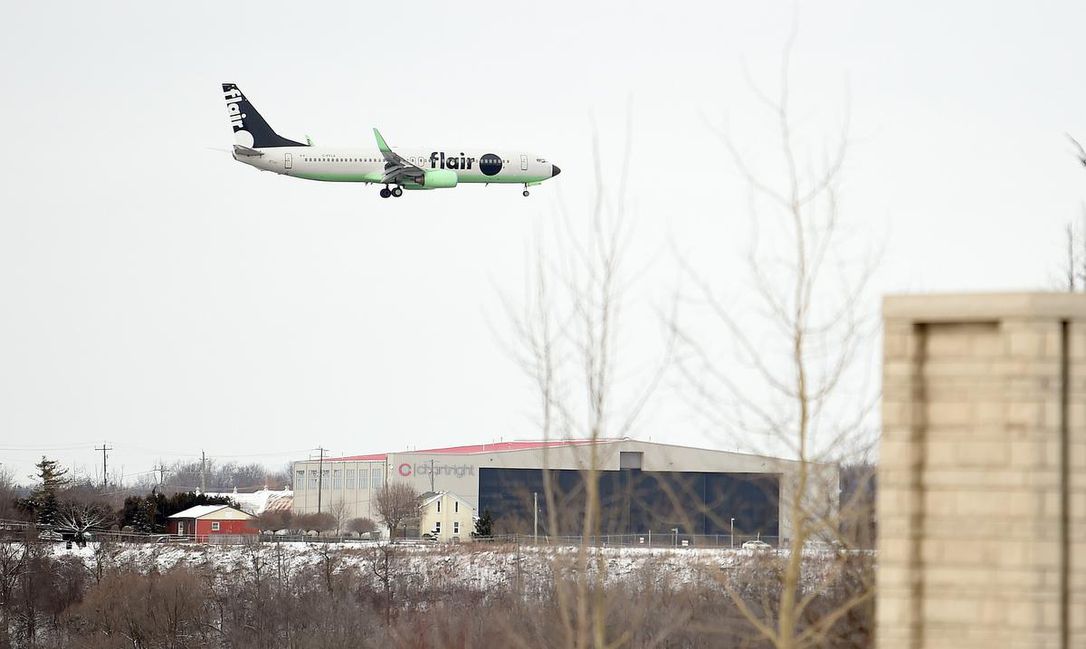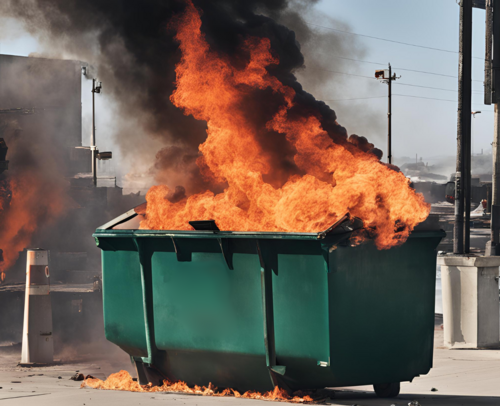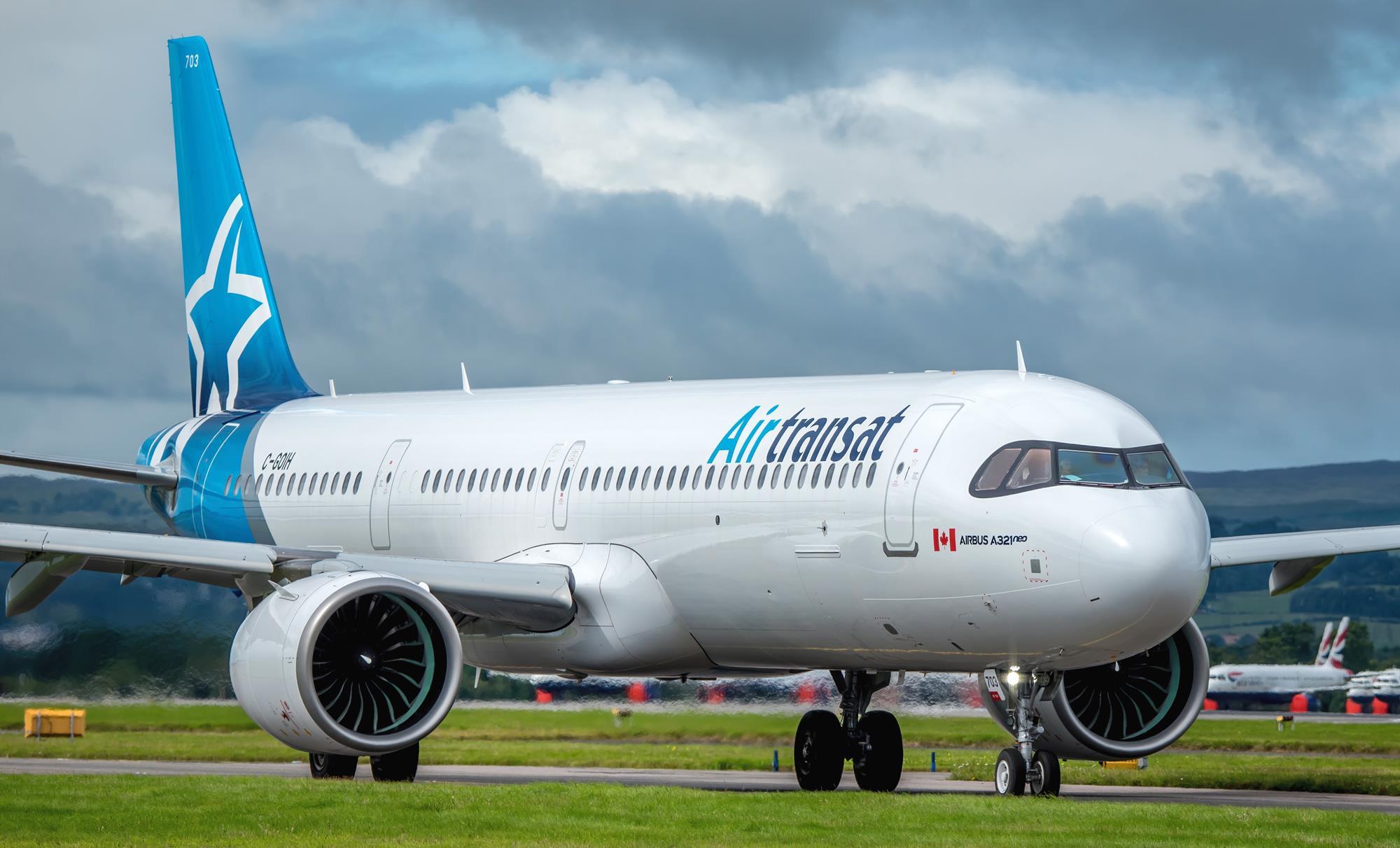
Passengers told to ‘Brace, brace’ as plane diverted to Toronto because of mechanical problem
By Catherine Thompson, Record Reporter | Monday, January 10, 2022
A Flair airlines plane prepares to land at Region of Waterloo International Airport. DAVID BEBEE / WATERLOO REGION RECORD FILE PHOTO
WATERLOO REGION — A passenger on a Flair Airlines flight that made an emergency landing in Toronto last week after being diverted from Kitchener said the experience was “a big scare.”
“As we’re approaching Toronto, just minutes before the plane is about to touch down, an announcement is made to ‘Brace, brace, brace,’ and we were told, ‘Everybody get your heads down,’ ” recalls Neil McKinnon of the emergency landing on Jan. 4.
“I was running it through my head, ‘Well, this plane is crashing. Is this going to kill me?’ ” McKinnon said.
The plane landed safely, but stayed on the tarmac afterwards. McKinnon could see the flashing lights of emergency vehicles, and fire trucks circling the aircraft, before the crew announced they were verifying the plane was safe to go to the terminal.
The federal Transportation Safety Board confirmed in an email that a Boeing 737-86N operated by Flair Airlines, flying from Edmonton, was set to land at the Region of Waterloo International Airport early on Jan. 4. On the approach to the airport in Breslau, the plane’s flaps failed to extend properly. The flaps help to shorten the amount of runway length needed for takeoff and landing.about:blank
“The flight crew actioned the appropriate checklist and requested a diversion to Toronto/Lester B. Pearson International Airport (CYYZ), Ontario, where they requested to have airport rescue and firefighting services standing by to inspect the aircraft after landing, which would be performed at a reduced flap setting,” said Chris Krepski, a spokesperson for the safety board, in an email.
The incident is classed as a “Class 5 occurrence,” which is less serious, with little or no release of dangerous goods and minimal damage to property or the environment.
Emergency vehicles were sent to meet the plane as it landed “as per our standard response,” said Tori Gass, a spokesperson for the Greater Toronto Airports Authority.
The crew informed passengers of the mechanical failure, and the pilot said he was available to give passengers more details, but at 2 a.m., with the need to come up with a plan for how to get home, “most people got off that plane pretty quickly,” McKinnon said.
After emailing the airline’s CEO, McKinnon said he got a detailed reply from Matthew Kunz, Flair’s vice-president of operations, who said the captain diverted the flight as a precaution to Toronto, which has a longer runway.
“At the same time, again as a precaution, he informed the Flight Attendants to prepare the cabin and passengers in case there were additional issues on landing that the pilots may not have been aware of,” Kunz wrote. “This was a prudent measure on the part of the Captain. As part of that decision Air Traffic Control had the emergency vehicles meet the aircraft after landing to visually assess if the aircraft was damaged in any way and, when it was determined that there was no damage, the aircraft taxied to the gate as normal.
“There is no doubt that the situation can cause stress for passengers but the crew assessed the situation and prepared for what could be a more serious scenario than the one they were in fact dealing with. The Captain, as I mentioned, prepared based on limited information and based on being highly cautious,” Kunz wrote.
It’s the first time that Flair has had to divert an aircraft for a mechanical reason, Kunz said in an interview. The problem with the computer that controls the flaps was corrected within a couple of days, he said.
That reply was helpful and reassuring, McKinnon said, but should have been made available to all passengers, he said.
The situation was unusual, Kunz said: normally if a flight is diverted, say for weather, airline staff have ongoing contact with passengers that are being rerouted on another flight or put up in a hotel. In this case, most passengers just scattered upon landing to make their way home.
McKinnon was unimpressed with Flair’s customer service response.
At the gate, an agent from Flair said passengers should keep receipts from any extra costs for the trip from Toronto and that the airline would reimburse them, McKinnon said.
But despite numerous calls and emails to the airline, he has yet to receive information about how to get reimbursed for expenses related to the diversion, instead twice receiving an identically worded email saying the problem was due to weather.
The holiday period, and many weather delays, meant there were lots of calls to customer service, Flair said. But “We have to acknowledge the fact that some errors were made on the customer service side, and it’s our job to rectify them,” Kunz said.
Flair said it has apologized to McKinnon and is contacting all 86 passengers on the flight to let them know how they can be reimbursed. “We’re going to reimburse them if they have a $110 taxi fare to get home because we dropped them in Toronto instead of Kitchener,” Kunz said.
Flair stressed that customers can always reach the airline with concerns on the airline’s website flyflair.com/contact-us.



